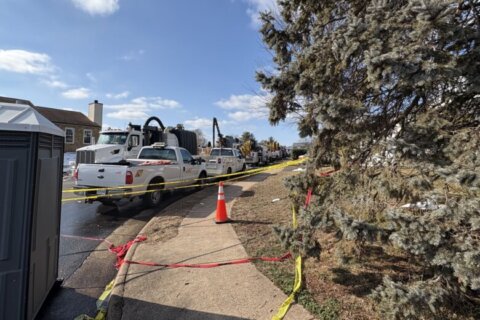Fairfax County’s co-responder program, which expanded last year, has helped respond to over 2,000 calls since its inception, according to the county’s 2023 Diversion First annual report.
The program, which launched in 2021 and pairs a Fairfax County police officer with a crisis intervention specialist, expanded last year. It now has four teams that respond to calls between noon and midnight, seven days a week.
It also includes a Post Response Team, “which is comprised of a clinician and a peer recovery specialist to provide that post-crisis specialist,” said Lisa Potter, the county’s Diversion First manager.
As of Dec. 31, 2023, the co-responder teams were a part of over 2,100 calls for service, according to the 16-page report, which was recently published and offers a glimpse into the way county programs work to help prevent incarceration for those with mental illness, developmental disabilities and substance use disorders.
Of the over 2,100 calls, close to half of them were resolved in the field, according to the report, and about a quarter of them resulted in diversion from an arrest and/or hospitalization.
“When law enforcement is dispatched to a community situation and it turns out to be (a) primary mental health situation, they sometimes will stand down, and they will call the community services board to have a mental health counselor come out and interact with the individual,” said Daryl Washington, executive director of the Fairfax-Falls Church Community Services Board. “But with the co-responder, there’s not that need for that wait.”
Instead, Washington said, responders can quickly take action depending on what they’re seeing when they arrive at a scene.
The initiatives that fall under Diversion First aim to “decriminalize mental illness and individuals with substance use and developmental disabilities,” Washington said. Funding for them comes from the county government, the state and grants.
Broadly, Potter said the programs are helping divert thousands of people away from potential arrests every year. Of the people diverted to the Merrifield Crisis Response Center, 80% haven’t had a repeat visit in a year.
“We’re continuing to see a rise in the number of people that are diverted consistently each year, which is great,” Potter said.
The county has been deliberate in trying to strengthen “the first touch points that individuals have with our emergency and crisis system,” Washington said, and part of that is making sure the few dozen mental health calls coming into 911 every day are answered by someone who is trained to help.
There are a few mental health clinicians embedded in the 911 call center, Washington said, and the county has a separate partnership with HopeLink, another crisis call center. The crisis call center also has the ability to dispatch the county’s crisis response teams.
As part of the Diversion First efforts, capacity in the county’s Drug Treatment Court is doubling, from 25 to 50, and is launching a Young Adult 18-25 track.
“The drug court team was noticing that they were getting a lot of young adults, so we were able to procure funding to launch a new group specifically for young adults,” Potter said.
More information about the county’s Diversion First program is available online.
Get breaking news and daily headlines delivered to your email inbox by signing up here.
© 2024 WTOP. All Rights Reserved. This website is not intended for users located within the European Economic Area.








